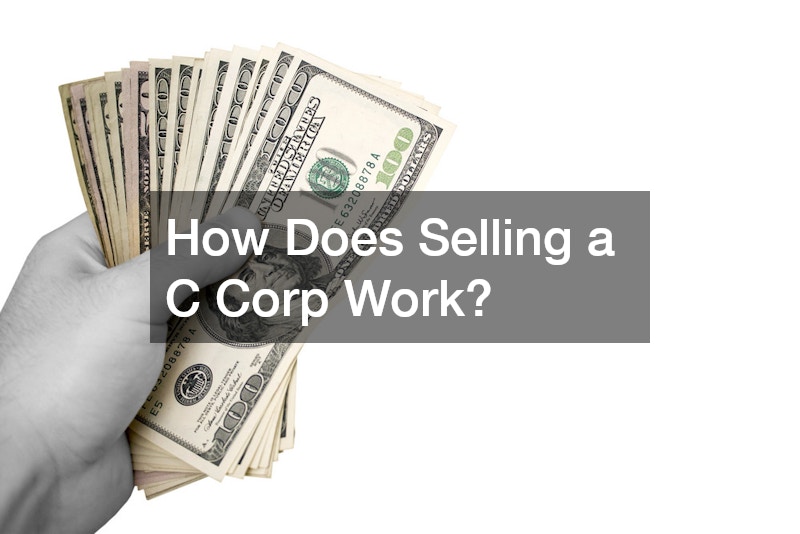In this article, we will explore the nuances of selling a C Corp, addressing key considerations and frequently asked questions surrounding this complex process. Understanding how to sell a C Corp can help business owners effectively manage their expectations and optimize the sale outcome.
What Are the Key Steps in Selling a C Corp?
Preparing the Business for Sale
When preparing a C Corp for sale, it is crucial to address fundamental aspects such as conducting a thorough financial audit. This audit ensures that potential buyers can trust the financial statements, thereby increasing confidence in the transaction.
Additionally, updating corporate records and ensuring compliance with all legal requirements are essential steps.
Comprehensive preparation facilitates a smooth transition during the sale process by highlighting the business’s strengths. Having up-to-date records also allows sellers to present a clear picture of any contingent liabilities that might affect buyer interest. Effective preparation can lead to higher offers and a more successful sale.
Consideration should also be given to the physical and operational status of the business. This includes optimizing workflows, ensuring all systems are updated, and addressing any internal inefficiencies. Such actions demonstrate operational readiness and reassure potential buyers about the ongoing viability of the company.
Valuation of the C Corp
Valuing a C Corporation accurately requires a nuanced understanding of different valuation methods. An asset-based valuation focuses on the company’s tangible and intangible assets, providing a baseline figure for potential buyers. Alternatively, earning value approaches analyze past and projected earnings to determine the business’s worth.
Market value assessments, meanwhile, consider how similar companies in the same industry are being valued in the marketplace. It is also crucial to understand that different buyers will perceive value differently based on their own strategic objectives. Engaging with valuation experts ensures a fair and realistic pricing approach is used.
The chosen valuation method significantly impacts the negotiation process. A solid valuation strategy helps establish a credible asking price. It ultimately guides the conversation with interested parties, shaping the transaction’s financial foundations.
Negotiating the Sale
Negotiating the sale of a C Corporation requires careful consideration of terms and conditions attractive to both buyers and sellers. Establishing the structure of the transaction, whether it is a straight sale or involves additional mechanisms like earnouts, is critical. Earnouts, for instance, can align seller expectations with post-sale company performance, bridging gaps between differing valuations.
An often-underestimated element in negotiations is the inclusion of non-compete agreements. These agreements protect the buyer from immediate competition by the seller and help maintain business continuity. Addressing these and other conditions upfront creates a smoother path to agreement.
Sellers should remain flexible yet focused on their primary objectives during negotiations. Maintaining clear communication and understanding buyer motivations can lead to mutually beneficial agreements. It also fosters goodwill and positive relationships that can be valuable beyond mere financial transactions.
What Are the Tax Implications of Selling a C Corp?
Understanding Double Taxation
One of the primary tax concerns when selling a C Corporation is the issue of double taxation. This occurs because both the company and its shareholders may face taxes on proceeds from a sale. To mitigate such impacts, it is crucial to explore strategic tax planning options prior to the transaction.
Strategies include considering the timing of the sale to take advantage of lower tax rates or spreading the income over multiple years to reduce taxable income in any single period. Another approach is structuring the transaction to defer taxes, either through installment sales or by reinvesting proceeds in other ventures. These strategies can significantly influence the net outcome of the sale.
Working with tax advisors who understand the intricacies of corporate sales can help identify and implement these strategies. Their expertise ensures compliance with regulations while optimizing tax liabilities. Proper planning minimizes financial burdens associated with double taxation, enhancing the transaction’s overall efficiency.
Asset Sale vs. Stock Sale
The decision between an asset sale and a stock sale affects the tax implications for both buyer and seller. In an asset sale, buyers purchase individual assets and liabilities, which often results in higher tax liabilities for the seller due to capital gains tax. However, buyers might prefer this structure as it offers potential tax benefits by enabling asset depreciation.
A stock sale involves the buyer purchasing the entire equity of the company, which can simplify the transaction and facilitate integration. From the seller’s perspective, this approach might lead to more favorable long-term capital gains tax treatment. However, it could also burden the buyer with hidden liabilities not reflected in asset transactions.
Careful consideration of these two structures, perhaps with guidance from both tax and legal experts, is vital. Understanding how each impacts both parties’ tax situations helps in structuring the sale to maximize benefits and minimize risks. Thoughtful planning ensures fairness and satisfaction in the final transaction.
Utilizing Tax Advisors
The role of tax advisors is paramount in navigating the complexities of selling a C Corporation. These professionals provide insight into tax codes and regulations that affect the transaction. Prioritizing this expertise early in the process can uncover opportunities to optimize tax outcomes.
Tax advisors can analyze the corporation’s current tax posture and suggest structural changes to enhance fiscal efficiency. They can recommend strategies to mitigate taxes and enhance profits, ensuring compliance while leveraging available tax benefits. Their guidance is integral in developing a comprehensive tax strategy tailored to individual circumstances.
Ultimately, the expertise of tax advisors provides peace of mind and clarity throughout the sale process. Their involvement reassures both buyers and sellers, reducing uncertainties associated with financial obligations. Effective use of tax advisors can significantly smooth the path to a successful sale.
Selling a C Corporation involves numerous steps and considerations, from preparing the business for sale to understanding the tax implications. By thoroughly addressing each aspect of the sale and seeking expert advice, sellers can successfully sell their C Corp while maximizing value and mitigating potential risks.
.









